In recent years, a lot of evidence is accumulating on how to delay the onset and progression of dementia. Memory Center at the National Center for Geriatrics and Gerontology (NCGG) is intensively conducting the following research, from the perspective of brain metabolism and linkage between brain and other organs.
We are conducting the Japan-multimodal intervention trial for prevention of dementia (J-MINT) study to examine whether multidomain interventions, such as treatment of lifestyle disease, exercise, nutritional guidance, and cognitive training, can delay the onset dementia in older people at risk for dementia. The J-MINT study is a national project aimed at future social implementation. Using the latest blood biomarkers for dementia and brain imaging techniques, J-MINT study will clarify the mechanisms of progression of dementia.
Diabetes mellitus is a risk for dementia. We have been contributing to develop the "Guidelines for the Treatment of Diabetes in the Older Adults". To provide further evidence, the multi-domain intervention trial in older adults with type 2 diabetes for prevention of dementia in Japan (J-MIND-Diabetes) study is now going. We are also interested in malnutrition and weight loss in the later life. In mid-life, obesity is a risk for dementia, but low nutrition status increases the risk factors for dementia in the older people. We are analyzing the clinical meaning of weight loss in the prodromal stage of dementia in our database of 10,000 patients in the NCGG Memory Center. Reverse translational experiments are being conducted to analyze the mechanism of weight loss.
Both genetic and environmental factors are contributing to the development of dementia. Using large clinical and genetic data set from the Memory Center and Medical Genome Center at the NCGG, integrated analyses of the genetic and acquired risks for dementia are progressing.
Person- and family-centered dementia care
It is crucial to consider the caregivers’ burden in dementia care. We have developed a psychoeducational program to reduce the caregivers’ burden in a multidisciplinary manner. We have clarified effectiveness of our program by randomized controlled trial and are now conducting a new educational program for both persons with dementia (PWD) and their family. This program are expected to improve the QOL of PWD and their caregivers.
Research on the long-term prognosis of dementia is the most important information in the medical treatment and care of dementia, but there has been no data collection in Japan. By expanding the database of the NCGG Memory Center, we would like to clarify the long-term prognosis of each type of dementia.
11C-DPA713 is a PET radiotracer developed for imaging the expression of translocator protein (TSPO) in glial cells which is regarded as a marker of the neuro-inflammatory burden. We will quantify the in-vivo brain inflammation with an 11C-DPA713-PET imaging in AD subjects. At the same time, we will perform the clinical assessment and do the analysis of the in-vivo substances related to inflammation in blood and cerebrospinal fluid (CSF). Then we will testify the multifaceted role of inflammatory process in the AD pathology systemically. Through the study, we will identify the biomarker of the inflammation of the brain in blood and CSF, and establish the basic ground of the treatment of AD due to intervention to the inflammatory process.
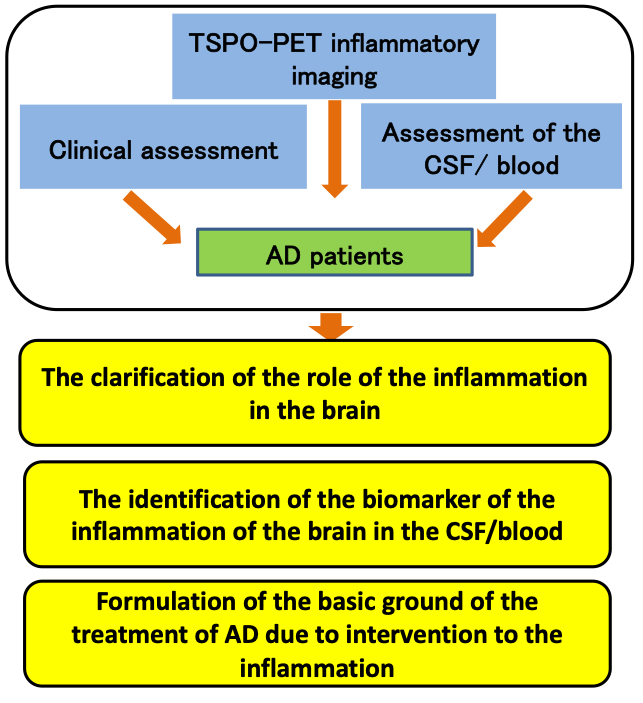
The relationship between central glial activation and peripheral proinflammatory material of
Alzheimer's desease measured by PET-TSPO imaging
Fumihiko Yasuno, M.D ph.D.
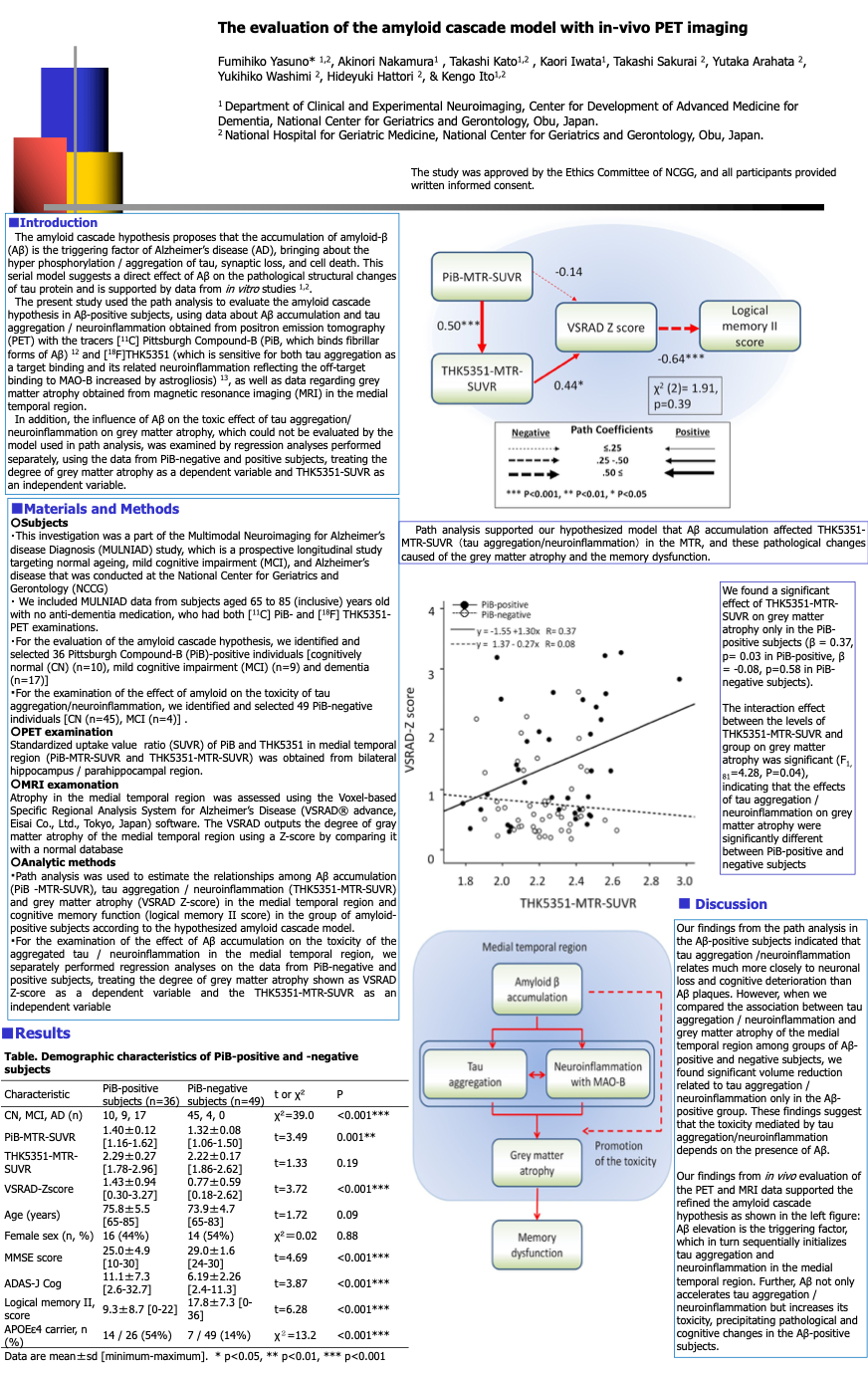
Our center offers "Holistic Physic-cognitive Rehabilitation," an outpatient rehabilitation program for people with MCI or dementia and their family caregivers. We carefully evaluate the individual's abilities and the family's situation, and provide 80 minutes of rehabilitation once a week according to their symptoms. Since this program is conducted in a group setting, it also leads to social interaction with others. For the patients, rehabilitation is provided to maintain and improve their cognitive function, physical function, and life skills. For their families, advice and support from specialists are provided to solve their problems in living together with people with MCI or dementia. Here, we have established a novel rehabilitation program and are researching its usefulness and effectiveness.

Cerebral small vessel diseases, including silent lacunar infarcts, white matter hyperintensities, and microbleeds, pose a risk for cerebrovascular disease, cognitive impairment, and the geriatric syndrome via effects on arterial stiffness.
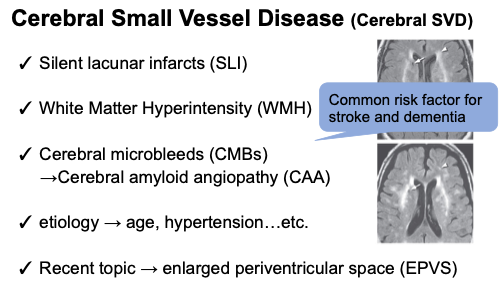
Arterial stiffness can be assessed using various indicators such as the ankle-brachial index, pulse wave velocity, cardio-ankle vascular index, and augmentation index. Arterial stiffness is independently associated with all components of cerebral small vessel disease including silent lacunar infarcts, white matter hyperintensities, and microbleeds, although there are some methodological differences between the various surrogate markers. Evidence of arterial stiffness indicates microvessel arteriosclerosis presenting with vascular endothelial dysfunction. Further, vascular narrowing due to atherosclerosis and vascular stiffness due to lipohyalinosis can accelerate the pulse waves. This hemodynamic stress, pulsatile pressure, or blood pressure variability can cause a ‘tsunami effect’ towards the cerebral parenchyma and lead to cerebral small vessel disease. Previous studies have shown that silent lacunar infarcts and white matter hyperintensities are strongly associated with arterial stiffness. However, the association between microbleeds and arterial stiffness remains controversial, as there are two vessel mechanisms related to microbleeds: cerebral amyloid angiopathy and hypertensive small vessel disease.
In FY2015, the National Center for Geriatrics and Gerontology, with support from the Japan Agency for Medical Research and Development, initiated the “Organized Registration for the Assessment of Dementia on Nation-wide General Consortium toward Effective Treatment in Japan,” otherwise known as the “ORANGE Registry.” In ORANGE Registry research, dementia is divided into stages: (1)the pre-clinical stage, (2) the mild cognitive impairment stage, and (3) the dementia care stage, with the goal of promoting social awareness of dementia, clinical trials and clinical research, and to prepare an infrastructure for implementing measures for dealing with dementia as reflected in the new ORANGE Plan.
In this study (Strategy to obtain warfarin or direct oral anticoagulant’s benefit by evaluating registry: Strawberry study), we investigate the relationship between oral anticoagulants, cognitive dysfunction and stroke in patients with atrial fibrillation using the ORANGE Registry research infrastructure as a foundation. Measures for dealing with dementia and stroke are a pressing issue for Japan and its ageing society. We have launched a website to allow people to learn about our research. We hope our study contributes to the treatment of dementia and stroke. We are most grateful for your continued guidance and encouragement.
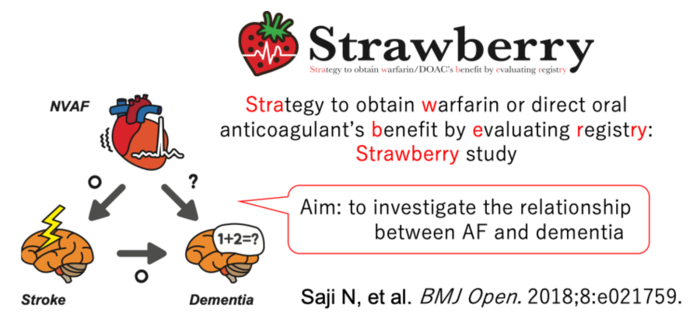
The gut microbiome is a hot topic in the field of health care research.
Recently, researchers have identified novel associations between the gut microbiome and life-threatning diseases. However, the relationship between the gut microbiome and dementia has not yet been fully clarified. We aimed to investigate the relationship between the composition of the gut microbiome and dementia in Japanese patients, using a comprehensive assessment of cognitive function.
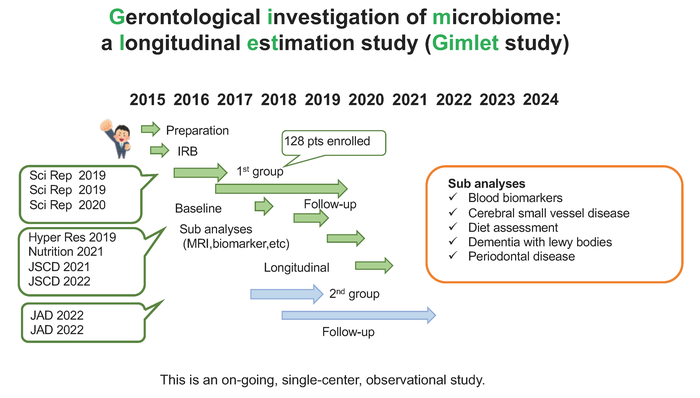
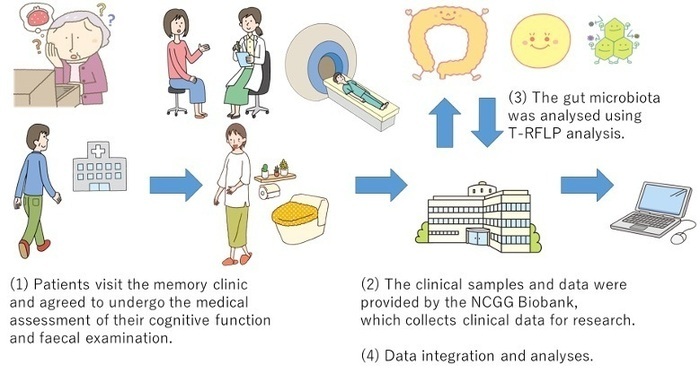
Study flow
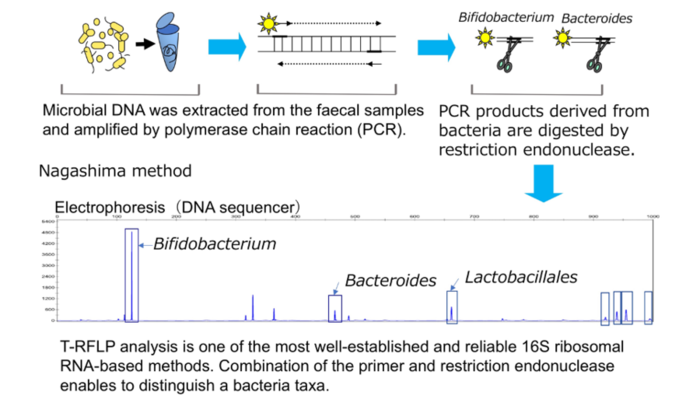
T-RFLP analysis (Terminal Restriction Fragment Length Polymorphism analysis)
Hearing loss reportedly increases the risk of dementia; however, clarity is lacking on both the actual situation and the effectiveness of interventions with hearing aids. National dementia prevention measures have been developed in Japan based on the “Comprehensive Strategy to Accelerate Dementia Measures (New Orange Plan)”, and hearing loss has been included as an important factor for dementia prevention. On the international front, the World Health Organization (WHO) has urged member countries to promptly and proactively address dementia prevention and hearing loss in elderly patients.
This research will be conducted to elucidate the effect of correction of hearing loss on cognitive function with a particular focus on elderly patients.